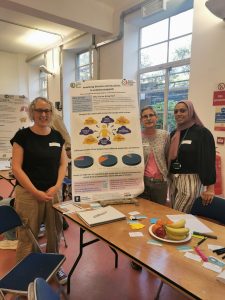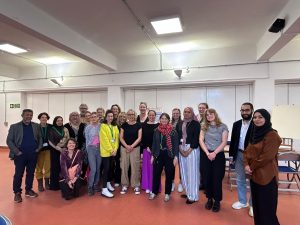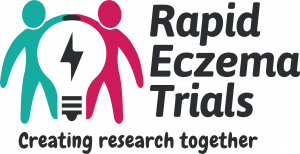September 27, 2024, by mszteh
Exploring community beliefs around clinical research
A wedding planner wouldn’t plan a wedding without input from the couple who are to be married…
So why would anyone do health research without input from the populations that they’re hoping to help?
Just like nearly weds will prefer certain arrangements over others, so will people find certain interventions more acceptable. And there’s no point planning a wedding that the couple won’t want, just like there’s no point producing a research outcome that society doesn’t want or won’t use.
That’s why the project I work on – Rapid Eczema Trials – is so exciting. It’s a Citizen Science project that involves people with lived experience of eczema in the design of online clinical trials.
Over 900 individuals have joined our Eczema Citizen Science Community. Through this, they hear about the different ways they can get involved in the project. Interestingly, although the ethnicity of the Community reflects the 2021 census data, we’re seeing a different picture when it comes to involvement in co-production groups and clinical trials. Asian ethnicities are highly represented in co-production groups – 22% compared with around 9% from the census data – but fall to only 6% of trial participants. Likewise, black ethnicities make up 4% of the co-production groups, but only 1% of trial participants.
Keen to explore the reasons for this, and to build trust in research in underrepresented communities, I was delighted to be offered a place at a recent event in London. Hosted by the charity Social Action for Health, I was one of seven Early Career Researchers who, alongside my Rapid Eczema Trials colleague Amanda Roberts, had the privilege of chatting about our research with members of underserved communities from Tower Hamlets. 
As members of the local communities started to arrive, my first thought was that there was no risk of awkward silences – the community buzz was exciting, friendly and loud. The room soon filled with 22 participants from the local Bangladeshi, Caribbean, African and White British communities. All researchers gave a five-minute presentation to the whole group. Then, while participants remained seated, researchers rotated around the tables to have more in-depth discussions. Amanda and I, with the help of translators, delved into conversation about eczema and clinical research with seven women and three men, aged 30–69, all representatives of the Bangladeshi community.
The overwhelming take-home message from our groups was that this community would be happy to get involved in research if it was their GP who told them about it. There didn’t seem to be as much trust in research from other healthcare professionals such as nurses or pharmacists. The people we spoke with did trust information from family members and their local community groups and faith leaders, emphasising the importance of researchers building relationships with local community leaders. It was also interesting to witness first-hand the social stigma that is sometimes associated with eczema in this community, and the acceptance of home remedies for many health conditions.
The organisers are currently collecting feedback from participants, and I’m delighted that one piece of feedback already received specifically relates to eczema:
“I learned eczema is not just on white skin, everybody and every community suffer eczema.”
The event was a really exciting one for me, and also a first – my first experience of engaging with underserved communities who have very little spoken English. I’m very grateful to have been given this experience and would like to thank Steph Hanley from the University of Birmingham for securing funding for the event. I also thank the Social Action for Health team for organising the day and linking us with the underrepresented community groups in Tower Hamlets.
Written by Emma Campbell
Research Fellow
If you would like to find out more about Rapid Eczema Trials, please visit our website or email us at eczema@nottingham.ac.uk
The Rapid Eczema Trials project involves researchers, healthcare professionals and citizen scientists (people with eczema and parents of children with eczema) working together to answer important questions about eczema by designing and running clinical trials together.
The Rapid Eczema Trials programme is sponsored by Nottingham University Hospitals NHS Trust and is funded by the National Institute for Health and Care Research (NIHR) under its Programme Grants for Applied Research programme (PGfAR NIHR203279). The views expressed are those of the author(s) and not necessarily those of the NIHR or the Department of Health and Social Care.
No comments yet, fill out a comment to be the first




Leave a Reply